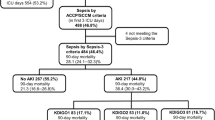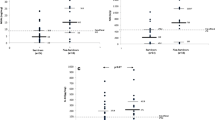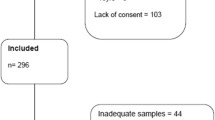Abstract
Background
Different molecular forms of urinary neutrophil gelatinase-associated lipocalin (NGAL) have recently been discovered. We aimed to explore the nature, source and discriminatory value of urinary NGAL in intensive care unit (ICU) patients.
Methods
We simultaneously measured plasma NGAL (pNGAL), urinary NGAL (uNGAL), and estimated monomeric and homodimeric uNGAL contribution using Western blotting-validated enzyme-linked immunosorbent assays [uNGALE1 and uNGALE2] and their calculated ratio in 102 patients with the systemic inflammatory response syndrome and oliguria, and/or a creatinine rise of >25 μmol/L.
Measurements and main results
Bland–Altman analysis demonstrated that, despite correlating well (r = 0.988), uNGAL and uNGALE1 were clinically distinct, lacking both accuracy and precision (bias: 266.23; 95 % CI 82.03–450.44 ng/mg creatinine; limits of agreement: −1,573.86 to 2,106.32 ng/mg creatinine). At best, urinary forms of NGAL are fair (area under the receiver operating characteristic [AUROC] ≤0.799) predictors of renal or patient outcome; most perform significantly worse. The 44 patients with a primarily monomeric source of uNGAL had higher pNGAL (118.5 ng/ml vs. 72.5 ng/ml; p < 0.001), remaining significant following Bonferroni correction.
Conclusions
uNGAL is not a useful predictor of outcome in this ICU population. uNGAL patterns may predict distinct clinical phenotypes. The nature and source of uNGAL are complex and challenge the utility of NGAL as a uniform biomarker.


Similar content being viewed by others
References
Mishra J, Dent C, Tarabishi R, Mitsnefes MM, Ma Q, Kelly C, Ruff SM, Zahedi K, Shao M, Bean J, Mori K, Barasch J, Devarajan P (2005) Neutrophil gelatinase-associated lipocalin (NGAL) as a biomarker for acute renal injury after cardiac surgery. Lancet 365:1231–1238
Mishra J, Ma Q, Prada A, Mitsnefes M, Zahedi K, Yang J, Barasch J, Devarajan P (2003) Identification of neutrophil gelatinase-associated lipocalin as a novel early urinary biomarker for ischemic renal injury. J Am Soc Nephrol 14:2534–2543
Nickolas TL, O’Rourke MJ, Yang J, Sise ME, Canetta PA, Barasch N, Buchen C, Khan F, Mori K, Giglio J, Devarajan P, Barasch J (2008) Sensitivity and specificity of a single emergency department measurement of urinary neutrophil gelatinase-associated lipocalin for diagnosing acute kidney injury. Ann Intern Med 148:810–819
Bagshaw SM (2011) Subclinical acute kidney injury: a novel biomarker-defined syndrome. Crit Care Resusc 13:201–203
Legrand M, Collet C, Gayat E, Henao J, Giraudeaux V, Mateo J, Launay JM, Payen D (2013) Accuracy of urine NGAL commercial assays in critically ill patients. Intensive Care Med 39:541–542
Zhang X, Gibson B Jr, Mori R, Snow-Lisy D, Yamaguchi Y, Campbell SC, Simmons MN, Daly TM (2012) Analytical and biological validation of a multiplex immunoassay for acute kidney injury biomarkers. Clin Chim Acta 415C:88–93
Xu SY, Petersson CG, Carlson M, Venge P (1994) The development of an assay for human neutrophil lipocalin (HNL)—to be used as a specific marker of neutrophil activity in vivo and vitro. J Immunol Methods 171:245–252
Dent CL, Ma Q, Dastrala S, Bennett M, Mitsnefes MM, Barasch J, Devarajan P (2007) Plasma neutrophil gelatinase-associated lipocalin predicts acute kidney injury, morbidity and mortality after pediatric cardiac surgery: a prospective uncontrolled cohort study. Crit Care 11:R127
Bennett M, Dent CL, Ma Q, Dastrala S, Grenier F, Workman R, Syed H, Ali S, Barasch J, Devarajan P (2008) Urine NGAL predicts severity of acute kidney injury after cardiac surgery: a prospective study. Clin J Am Soc Nephrol 3:665–673
Xu SY, Carlson M, Engstrom A, Garcia R, Peterson CG, Venge P (1994) Purification and characterization of a human neutrophil lipocalin (HNL) from the secondary granules of human neutrophils. Scand J Clin Lab Invest 54:365–376
Carlson M, Raab Y, Seveus L, Xu S, Hallgren R, Venge P (2002) Human neutrophil lipocalin is a unique marker of neutrophil inflammation in ulcerative colitis and proctitis. Gut 50:501–506
Cowland JB, Borregaard N (1997) Molecular characterization and pattern of tissue expression of the gene for neutrophil gelatinase-associated lipocalin from humans. Genomics 45:17–23
Bauer M, Eickhoff JC, Gould MN, Mundhenke C, Maass N, Friedl A (2008) Neutrophil gelatinase-associated lipocalin (NGAL) is a predictor of poor prognosis in human primary breast cancer. Breast Cancer Res Treat 108:389–397
Cowland JB, Sorensen OE, Sehested M, Borregaard N (2003) Neutrophil gelatinase-associated lipocalin is up-regulated in human epithelial cells by IL-1 beta, but not by TNF-alpha. J Immunol 171:6630–6639
Nielsen BS, Borregaard N, Bundgaard JR, Timshel S, Sehested M, Kjeldsen L (1996) Induction of NGAL synthesis in epithelial cells of human colorectal neoplasia and inflammatory bowel diseases. Gut 38:414–420
Roudkenar MH, Kuwahara Y, Baba T, Roushandeh AM, Ebishima S, Abe S, Ohkubo Y, Fukumoto M (2007) Oxidative stress induced lipocalin 2 gene expression: addressing its expression under the harmful conditions. J Radiat Res 48:39–44
Cai L, Rubin J, Han W, Venge P, Xu S (2010) The origin of multiple molecular forms in urine of HNL/NGAL. Clin J Am Soc Nephrol 5:2229–2235
Kjeldsen L, Johnsen AH, Sengelov H, Borregaard N (1993) Isolation and primary structure of NGAL, a novel protein associated with human neutrophil gelatinase. J Biol Chem 268:10425–10432
Blaser J, Triebel S, Tschesche H (1995) A sandwich enzyme immunoassay for the determination of neutrophil lipocalin in body fluids. Clin Chim Acta 235:137–145
Kjeldsen L, Koch C, Arnljots K, Borregaard N (1996) Characterization of two ELISAs for NGAL, a newly described lipocalin in human neutrophils. J Immunol Methods 198:155–164
Mishra J, Mori K, Ma Q, Kelly C, Barasch J, Devarajan P (2004) Neutrophil gelatinase-associated lipocalin: a novel early urinary biomarker for cisplatin nephrotoxicity. Am J Nephrol 24:307–315
Cai L, Borowiec J, Xu S, Han W, Venge P (2009) Assays of urine levels of HNL/NGAL in patients undergoing cardiac surgery and the impact of antibody configuration on their clinical performances. Clin Chim Acta 403:121–125
Martensson J, Xu S, Bell M, Martling CR, Venge P (2012) Immunoassays distinguishing between HNL/NGAL released in urine from kidney epithelial cells and neutrophils. Clin Chim Acta 413:1661–1667
Dellinger RP, Levy MM, Carlet JM, Bion J, Parker MM, Jaeschke R, Reinhart K, Angus DC, Brun-Buisson C, Beale R, Calandra T, Dhainaut JF, Gerlach H, Harvey M, Marini JJ, Marshall J, Ranieri M, Ramsay G, Sevransky J, Thompson BT, Townsend S, Vender JS, Zimmerman JL, Vincent JL (2008) Surviving Sepsis Campaign: International guidelines for management of severe sepsis and septic shock: 2008. Intensive Care Med 34:17–60
Zavada J, Hoste E, Cartin-Ceba R, Calzavacca P, Gajic O, Clermont G, Bellomo R, Kellum JA (2010) A comparison of three methods to estimate baseline creatinine for RIFLE classification. Nephrol Dial Transpl 25:3911–3918
Bellomo R, Ronco C, Kellum JA, Mehta RL, Palevsky P (2004) Acute renal failure: definition, outcome measures, animal models, fluid therapy and information technology needs: the Second International Consensus Conference of the Acute Dialysis Quality Initiative (ADQI) Group. Crit Care 8:R204–R212
Knaus WA, Wagner DP, Draper EA, Zimmerman JE, Bergner M, Bastos PG, Sirio CA, Murphy DJ, Lotring T, Damiano A et al (1991) The APACHE III prognostic system. Risk prediction of hospital mortality for critically ill hospitalized adults. Chest 100:1619–1636
Calzavacca P, Tee A, Licari E, Schneider AG, Bellomo R (2012) Point-of-care measurement of serum creatinine in the intensive care unit. Ren Fail 34:13–18
Taylor R (1990) Interpretation of the correlation coefficient: a basic review. J Diagn Med Sonogr 1:35–39
Bland JM, Altman DG (1986) Statistical methods for assessing agreement between two methods of clinical measurement. Lancet 1:307–310
Mantha S, Roizen MF, Fleisher LA, Thisted R, Foss J (2000) Comparing methods of clinical measurement: reporting standards for bland and altman analysis. Anesth Analg 90:593–602
Bland JM, Altman DG (1999) Measuring agreement in method comparison studies. Stat Methods Med Res 8:135–160
Haase-Fielitz A, Bellomo R, Devarajan P, Story D, Matalanis G, Dragun D, Haase M (2009) Novel and conventional serum biomarkers predicting acute kidney injury in adult cardiac surgery: a prospective cohort study. Crit Care Med 37:553–560
Krawczeski CD, Goldstein SL, Woo JG, Wang Y, Piyaphanee N, Ma Q, Bennett M, Devarajan P (2011) Temporal relationship and predictive value of urinary acute kidney injury biomarkers after pediatric cardiopulmonary bypass. J Am Coll Cardiol 58:2301–2309
Tuladhar SM, Puntmann VO, Soni M, Punjabi PP, Bogle RG (2009) Rapid detection of acute kidney injury by plasma and urinary neutrophil gelatinase-associated lipocalin after cardiopulmonary bypass. J Cardiovasc Pharmacol 53:261–266
Wagener G, Gubitosa G, Wang S, Borregaard N, Kim M, Lee HT (2008) Urinary neutrophil gelatinase-associated lipocalin and acute kidney injury after cardiac surgery. Am J Kidney Dis 52:425–433
Xin C, Yulong X, Yu C, Changchun C, Feng Z, Xinwei M (2008) Urine neutrophil gelatinase-associated lipocalin and interleukin-18 predict acute kidney injury after cardiac surgery. Ren Fail 30:904–913
Shapiro NI, Trzeciak S, Hollander JE, Birkhahn R, Otero R, Osborn TM, Moretti E, Nguyen HB, Gunnerson K, Milzman D, Gaieski DF, Goyal M, Cairns CB, Kupfer K, Lee SW, Rivers EP (2010) The diagnostic accuracy of plasma neutrophil gelatinase-associated lipocalin in the prediction of acute kidney injury in emergency department patients with suspected sepsis. Ann Emerg Med 56(52–59):e51
Haase M, Bellomo R, Devarajan P, Schlattmann P, Haase-Fielitz A (2009) Accuracy of neutrophil gelatinase-associated lipocalin (NGAL) in diagnosis and prognosis in acute kidney injury: a systematic review and meta-analysis. Am J Kidney Dis 54:1012–1024
Bagshaw SM, Bennett M, Haase M, Haase-Fielitz A, Egi M, Morimatsu H, D’Amico G, Goldsmith D, Devarajan P, Bellomo R (2010) Plasma and urine neutrophil gelatinase-associated lipocalin in septic versus non-septic acute kidney injury in critical illness. Intensive Care Med 36:452–461
de Geus HR, Bakker J, Lesaffre EM, le Noble JL (2011) Neutrophil gelatinase-associated lipocalin at ICU admission predicts for acute kidney injury in adult patients. Am J Respir Crit Care Med 183:907–914
Doi K, Negishi K, Ishizu T, Katagiri D, Fujita T, Matsubara T, Yahagi N, Sugaya T, Noiri E (2011) Evaluation of new acute kidney injury biomarkers in a mixed intensive care unit. Crit Care Med 39:2464–2469
Endre ZH, Pickering JW, Walker RJ, Devarajan P, Edelstein CL, Bonventre JV, Frampton CM, Bennett MR, Ma Q, Sabbisetti VS, Vaidya VS, Walcher AM, Shaw GM, Henderson SJ, Nejat M, Schollum JB, George PM (2011) Improved performance of urinary biomarkers of acute kidney injury in the critically ill by stratification for injury duration and baseline renal function. Kidney Int 79:1119–1130
Kokkoris S, Parisi M, Ioannidou S, Douka E, Pipili C, Kyprianou T, Kotanidou A, Nanas S (2012) Combination of renal biomarkers predicts acute kidney injury in critically ill adults. Ren Fail 34:1100–1108
Martensson J, Bell M, Oldner A, Xu S, Venge P, Martling CR (2010) Neutrophil gelatinase-associated lipocalin in adult septic patients with and without acute kidney injury. Intensive Care Med 36:1333–1340
Siew ED, Ware LB, Gebretsadik T, Shintani A, Moons KG, Wickersham N, Bossert F, Ikizler TA (2009) Urine neutrophil gelatinase-associated lipocalin moderately predicts acute kidney injury in critically ill adults. J Am Soc Nephrol 20:1823–1832
Royakkers AA, Bouman CS, Stassen PM, Korevaar JC, Binnekade JM, van de Hoek W, Kuiper MA, Spronk PE, Schultz MJ (2012) Systemic and urinary neutrophil gelatinase-associated lipocalins are poor predictors of acute kidney injury in unselected critically ill patients. Crit Care Res Pract 2012:712695
Cruz DN, de Cal M, Garzotto F, Perazella MA, Lentini P, Corradi V, Piccinni P, Ronco C (2010) Plasma neutrophil gelatinase-associated lipocalin is an early biomarker for acute kidney injury in an adult ICU population. Intensive Care Med 36:444–451
Constantin JM, Futier E, Perbet S, Roszyk L, Lautrette A, Gillart T, Guerin R, Jabaudon M, Souweine B, Bazin JE, Sapin V (2010) Plasma neutrophil gelatinase-associated lipocalin is an early marker of acute kidney injury in adult critically ill patients: a prospective study. J Crit Care 25(176):e171–e176
Vanmassenhove J, Vanholder R, Nagler E, Van Biesen W (2012) Urinary and serum biomarkers for the diagnosis of acute kidney injury: an in-depth review of the literature. Nephrol Dial Transpl 28(2):254–273
Grenier FC, Ali S, Syed H, Workman R, Martens F, Liao M, Wang Y, Wong PY (2010) Evaluation of the ARCHITECT urine NGAL assay: assay performance, specimen handling requirements and biological variability. Clin Biochem 43:615–620
Haase M, Haase-Fielitz A, Bellomo R, Mertens PR, (2010) Neutrophil gelatinase-associated lipocalin as a marker of acute renal disease. Curr Opin Hematol
Vaidya VS, Waikar SS, Ferguson MA, Collings FB, Sunderland K, Gioules C, Bradwin G, Matsouaka R, Betensky RA, Curhan GC, Bonventre JV (2008) Urinary biomarkers for sensitive and specific detection of acute kidney injury in humans. Clin Transl Sci 1:200–208
Kidney Disease: Improving Global Outcomes (KDIGO) Acute Kidney Injury Work Group (2012) KDIGO clinical practice guideline for acute kidney injury. Kidney Int Suppl 2:1–138
Lassnigg A, Schmidlin D, Mouhieddine M, Bachmann LM, Druml W, Bauer P, Hiesmayr M (2004) Minimal changes of serum creatinine predict prognosis in patients after cardiothoracic surgery: a prospective cohort study. J Am Soc Nephrol 15:1597–1605
Levy MM, Macias WL, Vincent JL, Russell JA, Silva E, Trzaskoma B, Williams MD (2005) Early changes in organ function predict eventual survival in severe sepsis. Crit Care Med 33:2194–2201
Praught ML, Shlipak MG (2005) Are small changes in serum creatinine an important risk factor? Curr Opin Nephrol Hypertens 14:265–270
Acknowledgments
This study was supported by the Austin Hospital Intensive Care Trust Fund. The ELISA testing was funded by a grant from the Swedish Medical Research Council to Uppsala University.
Conflicts of interest
Shengyuan Xu holds patents with, and receives royalties from, Diagnostics Development. Per Venge holds patents with, and stock in, P&M Venge AB. He has received royalties from Phadia. The remaining authors declare that they have no conflicts of interest.
Author information
Authors and Affiliations
Corresponding author
Electronic supplementary material
Below is the link to the electronic supplementary material.
Glossary
Glossary
- NGAL:
-
Neutrophil gelatinase-associated lipocalin, also known as human neutrophil lipocalin [HNL]). Released from multiple tissues. Present in plasma and urine
- Monomeric NGAL:
-
A 25-kD monomeric form of NGAL produced by both neutrophils and renal epithelium
- Homodimeric NGAL:
-
A 45-kD homodimeric form of NGAL produced by neutrophils
- Heterodimeric NGAL:
-
A 135-kD heterodimeric form of NGAL, covalently conjugated with gelatinase, produced by renal epithelium
- pNGAL:
-
NGAL measured in the plasma using the triage point-of-care NGAL test (Alere)
- uNGAL:
-
NGAL measured in the urine using the ARCHITECT platform (Abbott)
- uNGALE1 :
-
NGAL in the urine measured by a research assay utilising monoclonal antibody clones m763/m764. Detects a proportion of all forms of NGAL in the urine
- uNGALE2 :
-
NGAL in the urine measured by a research assay utilising monoclonal antibody clones m763/m765. Detects a fraction of homodimeric NGAL in the urine
- uNGALE1:uNGALE2 ratio:
-
A ratio of NGAL detected in the urine by the research assays >50. Distinguishes monomeric from homodimeric NGAL with an AUROC of 0.92
Rights and permissions
About this article
Cite this article
Glassford, N.J., Schneider, A.G., Xu, S. et al. The nature and discriminatory value of urinary neutrophil gelatinase-associated lipocalin in critically ill patients at risk of acute kidney injury. Intensive Care Med 39, 1714–1724 (2013). https://doi.org/10.1007/s00134-013-3040-7
Received:
Accepted:
Published:
Issue Date:
DOI: https://doi.org/10.1007/s00134-013-3040-7




